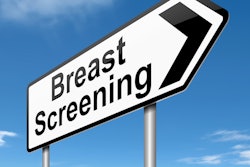
Women who identify as Black, Asian, or Hispanic are nearly 1.5 times more at risk for delayed follow-up than white women when it comes to mammograms classified as incomplete in the BI-RADS scale, according to a study published August 17 in the Journal of the American College of Radiology found.
Researchers led by Dr. Samantha Platt from Mount Sinai also found similar risk for women who preferred to complete screening questionnaires in Spanish, as well as double the risk for women not disclosing their background. They also found that BRCA-positive women are more likely to have shorter follow-up times.
"Identifying risk factors for no or delayed follow-up is crucial to guide public health efforts and to improve overall breast cancer outcomes," Platt and co-authors wrote.
Screening mammography has been a key factor in improving mortality rates related to breast cancer. However, its success is also tied to women attending follow-up visits for diagnostic workup on suspicious findings.
Mammograms with a score of BI-RADS 0 are considered incomplete and women need to return for further imaging. In these cases, a shorter time to follow-up can improve access to treatment and prevent breast cancers from progressing. The standard follow-up time from screening to final diagnosis is within 60 days.
There are several risk factors that can identify which patients may not get prompt follow-up. These include older age, BRCA-negative status, lower educational achievement, race, ethnicity, lower socioeconomic status, insurance type, and place of residence. But the researchers noted a lack of data linking such factors to delays in diagnostic imaging following an abnormal screening mammogram.
Therefore, Platt et al wanted to identify risk factors for delayed diagnostic follow-up with a 60-day period following an inconclusive BI-RADS-0 mammogram. They believed that race, ethnicity, and preferred written language would be tied to such delays.
The team included a total of 4,552 women in their study, of whom 904 had no follow-up. Of the 3,648 women with follow-up, 2,797 (76.7%) had their visits within 60 days, with a median of 20.2 days. The remaining 851 women had follow-up past the 60-day mark, with a median of 175.9 days.
| Factors affecting whether women attend follow-up for BI-RADS 0 mammograms | ||
| Racial/ethnic background | Odds ratio | p-values |
| White | 1 (reference) | N/A |
| Black/African American | 1.64 | < 0.0001 |
| Other | 1.45 | 0.005 |
| Asian | 1.43 | 0.022 |
| Hispanic | 1.05 | 0.693 |
| Not reported | 2.13 | < 0.0001 |
Despite the difference in follow-up times in the Hispanic cohort not achieving statistical significance in the multivariate analysis, the researchers found in their univariate analysis that Hispanic women were significantly more likely to have no follow-up (19.9% vs. 19.6%) as well as follow-up over 60 days (21.4% vs. 17.4%).
The group also found that women who completed the questionnaire in English as opposed to Spanish had shorter median follow-up times, 34 days versus 26 days (p < 0.0001). Women who use the Spanish language also had increased odds of not attending follow-up (odds ratio, 1.46; p = 0.025).
Also, having a known positive BRCA status was tied to significantly shorter follow-up times, 22 days versus 27 days (p = 0.021).
Platt and colleagues added that time to follow-up was not significantly different when women were analyzed by age, parity, or Tyrer-Cuzick score.
They wrote that difficulties in access to care may be to blame for these disparities, adding that women who chose not to disclose their race or ethnic background may have a level of healthcare mistrust, which may contribute to their follow-up delays. The study authors called for further research to understand the existence of these disparities, as well as how they can be reduced.
"Culturally sensitive navigation programs represent a potential opportunity for reducing these disparities," they wrote.




















